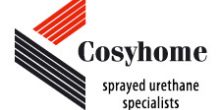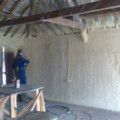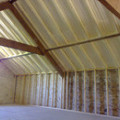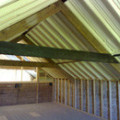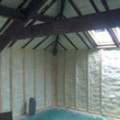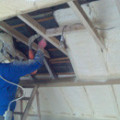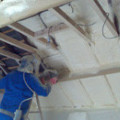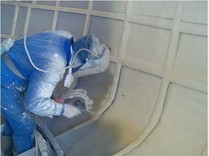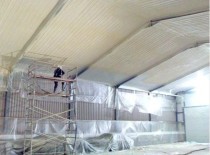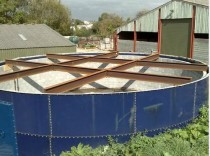![]()
The alternative answer to a new roof
Cosyhome Undaspray System
The sprayed polyurethane foam remedial treatment for unfelted tile and slate roofs.
Cosyhome Undaspray is closed-cell rigid polyurethane foam sprayed onto the substrate to seal and consolidate roofs suffering from slippage of slates and tiles and to seal against ingress of wind driven snow and rain.
If your roof
-has no under felt
-has an under felt which is tattered and torn
-suffers from ingress of wind driven snow and rain
-suffers from slipping slates or tiles
Cosyhome Undaspray provides:
- roof sealing against wind driven rain and snow
- helps provide air tightness
- roof consolidation
- one day completion for average roofs
- no scaffolding
- no disruption
- local authority approved
Loft and Barn conversions
Spray applied polyurethane foam can be used extensively in the conversion of barns or lofts. The foam is applied as a liquid to the underside of the felt or roof tiles to create a warm roof
construction without the need for ventilation, similarly it can be applied to walls between timber frame studwork sealing all gaps and then covered with plasterboard.
Spray applied foam can be applied directly onto concrete floors then a conventional screed applied on top.
Advantages of polyurethane foam
- low thermal conductivity means less thickness required over conventional materials
- lightweight, low load bearing to roofs
- excellent adhesive properties
- recommended by architects and surveyors
- can be used in grade I and II listed buildings
- creates an air tight seamless insulated area
On this photo all featured timbers were masked prior to application of foam to protect from overspray.
Injected polyurethane
Polyurethane foam can be used to stabilise cavity walls suffering from wall tie failure. A polyurethane foam system called “Isothane Techitherm” or "BASF Walltite" can be injected into a
masonry wall through correctly spaced holes.
The liquid expands in the cavity and sets into a rigid foam which adheres to the inner and outer leaves so they become totally bonded together.
This method of cavity filling has far superior insulation values than conventional materials i.e. polystyrene beads, fibreglass etc and therefore meet building regulations without the need for
expensive cladding.
The closed cell foams are resistant to driving rains and is an ideal material to use in exposed coastal and high altitude properties.
